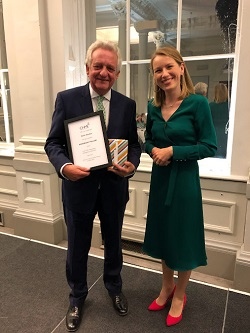CHME Annual Research Conference 2022
8th Jan 2022
Paper submissions are open until Monday 17th January 2022. Please see below for further details.
We would be delighted to welcome you to Edinburgh for CHME 2022.
Dr Louise Todd
Associate Professor
International Festival and Event Management, Tourism and Languages Subject, The Business School, Craiglockhart Campus, Edinburgh Napier University, Edinburgh EH14 1BR
Public Engagement Lead for the Business School
Email: l.todd@napier.ac.uk
Staff profile: www.napier.ac.uk/louise-todd
CHME 2022 Conference Coordinator
Email: CHMEconference2022@napier.ac.uk
The 30th Council for Hospitality Management Education (CHME) Annual Research Conference
Call for Papers
25th -27th May 2022, Edinburgh Napier University, UK

The Human Touch in Hospitality
The forthcoming 30th Council for Hospitality Management Education (CHME) 2022 will take place in Edinburgh, UK, from 25th-27th May 2022 with the theme the Human Touch in Hospitality.
“Hospitality is society – flickering moments, little islands, magic touches, throwntogetherness, now you see it, now you don’t stuff, but constitutive of and constituted by society. It is the stuff that gets done, and in so doing makes society happen” (Bell, 2012: 149)
The past thirty years of CHME have witnessed a vast global shift from analogue to digital hospitality facilitated by the advent of the internet and more recently, alongside the global pandemic, the increasing use of smart phones; digital media; social media; virtual reality and artificial intelligence.
In today’s digital world, the act of hospitality is increasingly digitally enabled through online bookings, digital media, use of Apps and other related tools. Nevertheless, human beings remain at the heart of hospitality. In this conference we will reflect upon the following questions:
- How has the digital world impacted on the meaning of hospitality?
- Where is the human touch in hospitality today?
- How can we as human beings shape hospitality for the future?
Conference Tracks
|
Track title |
Track chair |
|
|
Hospitality management |
Sarah Rawlinson University of Northampton Alisha Ali Sheffield Hallam University |
|
|
Critical and cultural studies of hospitality |
Peter Lugosi Oxford Brookes University |
|
|
Learning, teaching and assessment in hospitality management education (Clive Robertson award) |
Stephanie Jameson Leeds Beckett University |
|
|
Festivals and the human touch * |
Louise Todd Edinburgh Napier University |
|
|
Hospitable destinations * |
Constantia Anastasiadou Edinburgh Napier University |
* Two major themed tracks supplement existing tracks for CHME 2022
Theme 1: Festivals and the human touch
“Festival is an event, a social phenomenon, encountered in virtually all human cultures” (Falassi, 1987: 1).
Edinburgh is positioned as “the world’s leading festival city” (Festivals Edinburgh, 2019), and today the city attracts 4.5 million attendees from 70 countries worldwide (BOP Consulting and Festivals Edinburgh, 2016). Throughout human history, festivals have been at the centre of society and have served in communities as coordinated public celebrations that share common themes. The functional and symbolic meaning of the festival has been studied to gain an understanding of human society and culture (Falassi, 1987; Getz and Page, 2016). Nevertheless, in contemporary culture the festival has become a term associated with numerous forms of events set within urban and community contexts. While many of today’s festivals are inclusive celebrations of the arts and culture; others are purely commercially driven or exist as event tourism drivers (Getz and Page, 2016). As humans and hospitality are at the core of the functional and symbolic meaning of festivals, this themed track reflects on, but is not restricted to, the following areas:
- Festivals and the human touch: where are human beings, society, culture and hospitality located in festivals of today and the future?
- Festivals as access: being social phenomena across all human culture, can how, and should festivals be accessible, hospitable, and inclusive for different members and ‘tribes’ within communities?
- Festival cities and eventful places: how can we understand human interactions and engagement with festivals in their physical settings?
- Festivals, festivalisation and (over)tourism: are there too many festivals? If so, what does this mean for the future of festivals and the human touch in terms of festival stakeholders, such as attendees, staff, volunteers, the host community and festivals research?
- Festival design and experience: how do the human touch and hospitality influence the design and experience of festivals and events?
Theme 2: Hospitable Destinations
Destinations must balance conflicting priorities between having hospitable, open and friendly destination images of places that offer safe, yet stimulating experiences, in an environmentally and socially sustainable manner (Marra and Melotti, 2018). However, destinations may present themselves as inhospitable when they are lacking in welcome; when safety and security preoccupations dominate; or where local communities may feel as outsiders because of the commodification of their social spaces, public spaces and cultural practices and events. A backlash against tourism development and the emergence of bottom up initiatives that support alternative approaches to tourism development are how some communities have reacted to these challenges. In urban destinations, hospitality and hospitableness are packaged as traits to attract visitors, new residents and footloose capital (Bell, 2007) but the actual practices may ultimately make places inaccessible and exclusive rather than inclusive. This themed track raises the following questions, amongst others:
- Who are destinations open and hospitable to or with? Is the destination selectively open or open to all?
- How is the hospitality made apparent and real?
- Is there is a difference between being open and being welcoming?
- If the ‘throwntogetherdeness’ of people underpins society and culture in destinations, how can we understand hospitality as interpersonal relationships?
- Finally, as we gradually move further into the sphere of digital and artificial intelligence, what aspects of host guest relations will make a destination truly hospitable?
Call for Papers
The call from papers opens from Wednesday 29th September, with paper submissions from Monday 29th November. Paper and poster submission deadline is Monday 17th January 2022.
|
||||||||
Submission details
Conference Submission Categories
Papers of approximately 1500 words excluding references: These papers may be conceptual or empirical and should normally report on completed studies in one or more of the suggested track themes, however papers reporting on substantially developed work in progress will also be considered. All full papers will be subject to a double-blind reviewing process. If accepted, authors will normally be required to present in a 30-minute session (20 minutes for presenting the study and 10 minutes for questions) at the conference.
Posters: Authors are encouraged to use posters as an alternative means of presenting their research. This may be a more appropriate format for reporting on less developed work in progress.
For further details contact Dr Louise Todd, CHME 2022 Conference Coordinator: chmeconference2022@napier.ac.uk
More information available at: http://www.chme.org.uk/annual-conference/
References
Bell, D. (2007) The Hospitable City: Social Relations in Commercial Spaces Progress in Human Geography, 3(1): 7-22.
Bell, D. (2012). Hospitality is society. Hospitality & Society, 1(2), 137-152.
BOP Consulting and Festivals Edinburgh (2016). Edinburgh Festivals 2015 Impact Study, Final Report, July 2016, available at: http://www.edinburghfestivalcity.com/assets/000/001/964/Edinburgh_Festivals_-_2015_Impact_Study_Final_Report_original.pdf?1469537463
Falassi, A. (1987). Time out of Time: Essays on the Festival. University of New Mexico Press.
Festivals Edinburgh (2018) World Leading Festival City, available at: http://www.edinburghfestivalcity.com/the-city
Getz, D., & Page, S. J. (2016). Progress and prospects for event tourism research. Tourism Management, 52, 593-631.
Leadbeater, C. (2012) The Hospitable City Accessible from: https://www.watershed.co.uk/opencity/wp-content/uploads/2012/03/Charles-Leadbeater_Hospitable-City-May-2012.pdf, accessed 08/12/2019
Marra, E. and Melotti, M. (2018) Introduction in Marra, E. and Melotti, M (Eds) Mobilities and Hospitable Cities (p1-4). Cambridge Scholars Publishing: Newcastle upon Tyne.
|
This message and its attachment(s) are intended for the addressee(s) only and should not be read, copied, disclosed, forwarded or relied upon by any person other than the intended addressee(s) without the permission of the sender. If you are not the intended addressee you must not take any action based on this message and its attachment(s) nor must you copy or show them to anyone. Please respond to the sender and ensure that this message and its attachment(s) are deleted. It is your responsibility to ensure that this message and its attachment(s) are scanned for viruses or other defects. Edinburgh Napier University does not accept liability for any loss or damage which may result from this message or its attachment(s), or for errors or omissions arising after it was sent. Email is not a secure medium. Emails entering Edinburgh Napier University's system are subject to routine monitoring and filtering by Edinburgh Napier University. Edinburgh Napier University is a registered Scottish charity. Registration number SC018373 BSL users can contact us via contactSCOTLAND-BSL, the on-line British Sign Language interpreting service. Find out more on the contactSCOTLAND website. |
- Venue
- Edinburgh Napier University






